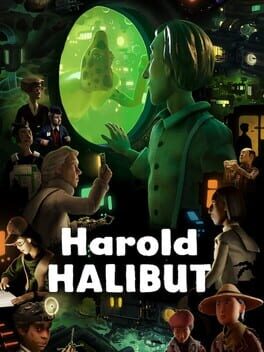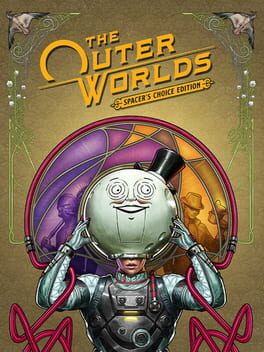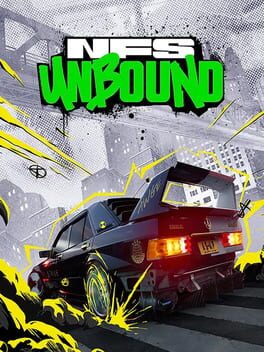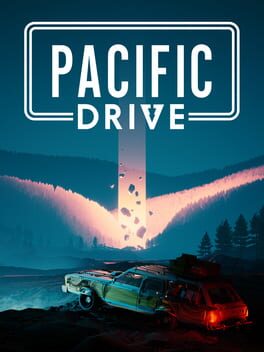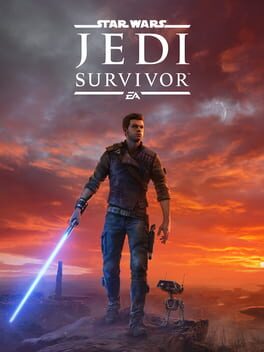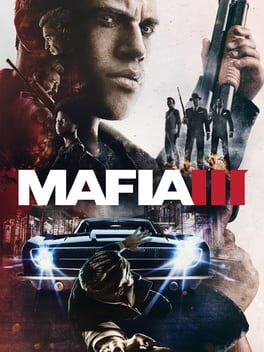sher_holder
2024
Indika is a nun who clutches the charm on her rosary beads til her left hand bleeds, knows how to drive a steambike, and may or may not be talking to the Devil.
From the couch, INDIKA--the game--can sometimes recall The Last of Us, both in how you explore the world, listening to conversations and rummaging through houses torn asunder, and how it spaces little puzzles and set pieces organically throughout its world. But it's also not at all like Ellie and Joel's adventure. It's more profane, and way more Russian: a quixotic mix of philosophy and psychedelia.
That said, like many walking sims, it isn't always fun to play. One of your very first tasks involves refilling a bucket from a well five times. On PS5, the 5.1 audio is unbalanced, the controls are finicky, and the (frequently awe-inspiring) visuals are jerky and unoptimized. Call it Eurojank, I don't mind--a frictionless gaming experience isn't one that can truly explore suffering, and like Disco Elysium, Indika can often be laugh out loud funny while it twists your arm.
So y'know...buy it.
From the couch, INDIKA--the game--can sometimes recall The Last of Us, both in how you explore the world, listening to conversations and rummaging through houses torn asunder, and how it spaces little puzzles and set pieces organically throughout its world. But it's also not at all like Ellie and Joel's adventure. It's more profane, and way more Russian: a quixotic mix of philosophy and psychedelia.
That said, like many walking sims, it isn't always fun to play. One of your very first tasks involves refilling a bucket from a well five times. On PS5, the 5.1 audio is unbalanced, the controls are finicky, and the (frequently awe-inspiring) visuals are jerky and unoptimized. Call it Eurojank, I don't mind--a frictionless gaming experience isn't one that can truly explore suffering, and like Disco Elysium, Indika can often be laugh out loud funny while it twists your arm.
So y'know...buy it.
2024
2024
I really, really wanted to enjoy Harold Halibut more than I did. Harold, our protagonist, is a fish out of water: an autistic-coded janitor slash jack-of-all-trades, whose daily grind involves doing various tasks for the mostly warm but slightly stuck up crew of scientists and venture capitalists aboard the marooned spaceship, The Fedora. The game is underwater, so there's the expected Bioshock-esque critique of capitalism run riot, presented with a more dry, wry sense of humor. The game makes a strong first impression, with several mysteries piling up alongside the slow reveal of this artful, beautiful world. I particularly loved how you get around on The Fedora via a salmon cannon that shoots the people from hub to hub (for a nominal fee).
And, c'mon, the art! I know it's not the most technical game running under the hood, but this game is a sight to behold. Each interior is handcrafted and rich with detail, but then digitalized and animated so that the puppetry has no strings. Even though the gameplay is light, I found myself mashing the trigger on the controller to zoom into each interior and soak in as much of the ambiance as I could. The soundtrack, too, is subtle but evocative, fading in and out when the player enters certain locations. Tremendous stuff.
During its introductory moments, I thought this game might be another Night in the Woods-esque narrative game, one that took a story and set it across many days so that you could build relationships and be rewarded for meandering from the main task routes at every turn. And, for a while, it was. I would get invited to dinner by the former pilot, or pore over love letters from decades past with the postman. And each character, lovingly designed and voice acted, always had something to say about life's meaning, or the dulling effect of daily jobs (and the threat of debtor's prison) in an alien, water-logged world.
But my return visits to the various wings of The Fedora yielded less and less surprise, or even change, as the days went on. By midgame, Harold had stumbled upon a seemingly huge reveal, with widespread implications for him, his shipmates--maybe even the human race--yet our daily tasks consisted of slow runs to the pharmacy with almost no diversity of content. It felt like we were being forced to play out an extended montage, a pain that only sharpened once the weeklong scenario ended with a literal montage.
Repetition in videogames is part of the act, of course. It can be gameplay, the ritualistic dance of combat that break up FPS campaigns, or the return trips of roguelites that build repetitiveness into their DNA as a means of player progression. But Harold Halibut seems to say: God, isn't capitalist bureaucracy boring and awful?" Yes, it is. And it's especially boring and awful when it's hammered home in a world as lush and gorgeous as Harold Halibut.
There is a payoff, and the narrative eventually does get going. But the jarring pace and tonal shifts never really go away.
I'm glad this game exists. And it's clear that there's a huge amount of work that's gone into this game and realizing its vision. Unfortunately, Harold Halibut isn't able to successfully navigate the choppy waters separating sincerity and comedy, and ends up splitting the two in a way that challenged me to go on.
In the end, Harold Halibut is way more niche than you might expect. Its messages on capitalism, and humanity's tendency toward resource drain even in the face of calamity, are all vital and integrated well into the story. I just wish the game, like its main character, was a little more self-assured.
And, c'mon, the art! I know it's not the most technical game running under the hood, but this game is a sight to behold. Each interior is handcrafted and rich with detail, but then digitalized and animated so that the puppetry has no strings. Even though the gameplay is light, I found myself mashing the trigger on the controller to zoom into each interior and soak in as much of the ambiance as I could. The soundtrack, too, is subtle but evocative, fading in and out when the player enters certain locations. Tremendous stuff.
During its introductory moments, I thought this game might be another Night in the Woods-esque narrative game, one that took a story and set it across many days so that you could build relationships and be rewarded for meandering from the main task routes at every turn. And, for a while, it was. I would get invited to dinner by the former pilot, or pore over love letters from decades past with the postman. And each character, lovingly designed and voice acted, always had something to say about life's meaning, or the dulling effect of daily jobs (and the threat of debtor's prison) in an alien, water-logged world.
But my return visits to the various wings of The Fedora yielded less and less surprise, or even change, as the days went on. By midgame, Harold had stumbled upon a seemingly huge reveal, with widespread implications for him, his shipmates--maybe even the human race--yet our daily tasks consisted of slow runs to the pharmacy with almost no diversity of content. It felt like we were being forced to play out an extended montage, a pain that only sharpened once the weeklong scenario ended with a literal montage.
Repetition in videogames is part of the act, of course. It can be gameplay, the ritualistic dance of combat that break up FPS campaigns, or the return trips of roguelites that build repetitiveness into their DNA as a means of player progression. But Harold Halibut seems to say: God, isn't capitalist bureaucracy boring and awful?" Yes, it is. And it's especially boring and awful when it's hammered home in a world as lush and gorgeous as Harold Halibut.
There is a payoff, and the narrative eventually does get going. But the jarring pace and tonal shifts never really go away.
I'm glad this game exists. And it's clear that there's a huge amount of work that's gone into this game and realizing its vision. Unfortunately, Harold Halibut isn't able to successfully navigate the choppy waters separating sincerity and comedy, and ends up splitting the two in a way that challenged me to go on.
In the end, Harold Halibut is way more niche than you might expect. Its messages on capitalism, and humanity's tendency toward resource drain even in the face of calamity, are all vital and integrated well into the story. I just wish the game, like its main character, was a little more self-assured.
2017
Coming back to automata, I find myself able to more easily forgive the little niggles that bothered me at first...the repetitive gameplay and inconsistent dialogue
...and more easily appreciate what is great here. The worldbuilding, visual design, and (DEAR LORD) the soundtrack are all outstanding. Yoko Taro has taken familiar tropes in science fiction, anime, and gaming and managed to meld them into something that is distinctly his own
...and more easily appreciate what is great here. The worldbuilding, visual design, and (DEAR LORD) the soundtrack are all outstanding. Yoko Taro has taken familiar tropes in science fiction, anime, and gaming and managed to meld them into something that is distinctly his own
2024
2024
I had to sell my car when I moved to NYC 9 years ago and this game reminds me of what I lost. The feeling of sitting out a storm, watching the rain streak on the windshield while music bleeds from the radio. Or of perilously watching the hydroplane warning light flicker at 3 am while sandwiched between two eighteen wheelers on I-95. It can be meditative in one moment, harrowing the next.
in typical sequel fashion, jedi: survivor is moreish to a fault. by the end I had tuned down the difficulty and started to autopilot through the game because I wanted to see the end of the story, but the combat systems couldn't keep me compelled past the 30 hour mark. still the level design is mostly great, and I appreciate how "gamey" this all feels. in many ways, the hub world of koboh is a collectathon in disguise, and I enjoyed slowly unveiling its map and learning more about its interesting but underutilized denizens. overall a good part two from respawn, but survivor lacks some of the novelty of the first entry and fails to build a strong villain (in this house we love trilla) by splitting its attention between a handful of baddies. still, where else can you drop kick a space gecko while rocking a mullet and a light sword?
2016
Mafia III is such a good 6 out of 10 game that I'm giving it a 7. Now is the stealth hopelessly broken? You bet it is. Your "whistle" magically calls enemies toward you to investigate, nevermind if they're on a whole floor above you. Are the missions woefully repetitive? Absolutely...this game has so much filler that it basically demands that the player either switch to their approaches or cheese their way through it in order to not die of boredom. Is the open-world undercooked and under utilized? Well...this one is just Mafia series tradition.
But I love it all the same. The game has one of the best openings in AAA gaming, and some tremendous dialogue and scene direction to boot. Even though Mafia III, at its root, is a pretty straightforward revenge tale, it is told in such a wonderful, layered way that I was always excited when the next cut scene rolled along. Lincoln is a brooding, cold hearted killer, yes, but he also has a reason for being so, and has friends and uneasy alliances all throughout the marsh that make the world that Hangar 13 captures feel bigger than the actual landmass itself.
And then, the DLCs, though they do little to fix the actual mechanics of play, find ways to change up the scenery and pacing in ways that I appreciate. From Dukes of Hazarding in a sundown town to living your own Rambo-esque mission in the wilds, each DLC seems to take a different cinematic approach that makes the pastiche work of influences that drive Mafia III that much more interesting.
So...is it fun to play? Sometimes. But Mafia III has heart, and characters that I'll remember forever, and that's why I love it, bruises and all.
But I love it all the same. The game has one of the best openings in AAA gaming, and some tremendous dialogue and scene direction to boot. Even though Mafia III, at its root, is a pretty straightforward revenge tale, it is told in such a wonderful, layered way that I was always excited when the next cut scene rolled along. Lincoln is a brooding, cold hearted killer, yes, but he also has a reason for being so, and has friends and uneasy alliances all throughout the marsh that make the world that Hangar 13 captures feel bigger than the actual landmass itself.
And then, the DLCs, though they do little to fix the actual mechanics of play, find ways to change up the scenery and pacing in ways that I appreciate. From Dukes of Hazarding in a sundown town to living your own Rambo-esque mission in the wilds, each DLC seems to take a different cinematic approach that makes the pastiche work of influences that drive Mafia III that much more interesting.
So...is it fun to play? Sometimes. But Mafia III has heart, and characters that I'll remember forever, and that's why I love it, bruises and all.
2022
I deeply appreciate elden ring, but, by the 40 hour mark it ran out of ways to keep me engaged outside of its core, punishing, combat loop.
elden ring marks fromsoft's first foray into the open world genre, and it largely is a success. the audio-visual presentation is brilliant, and the landscapes are striking. but here, unlike the open vistas of say, Breath of the Wild, each step further into the expanse is met with dread. my favorite moment, stepping into a seemingly bottomless well to reach the underworld for the first time, seemed to mark a change in tempo. there was a (simple) puzzle, a beautiful, almost tragic, boss, and an inviting beauty to a dark sky, starlit by the glimmer of cave rocks.
that type of exploration is the exception, not the rule. for most of the journey, you are a hammer, and the world is an excuse to present a series of nails. this singular focus on combat works in more poetic expanses, such as Shadow of the Colossus, but its unerring violence chewed away at the sense of discovery that so enthralled me during its opening hours.
my favorite open world games are ones that encourage discovery and engagement in ways beyond combat. here, the occasional fetch quests and story moments are so obfuscated by wonky design, that it's almost impossible to track unless you're playing with a wikia or a pen and paper in hand. this type of discovery works well in the more staged worlds of Dark Souls and Sekiro, but feels less at home in the massive world of Elden Ring.
elden ring marks fromsoft's first foray into the open world genre, and it largely is a success. the audio-visual presentation is brilliant, and the landscapes are striking. but here, unlike the open vistas of say, Breath of the Wild, each step further into the expanse is met with dread. my favorite moment, stepping into a seemingly bottomless well to reach the underworld for the first time, seemed to mark a change in tempo. there was a (simple) puzzle, a beautiful, almost tragic, boss, and an inviting beauty to a dark sky, starlit by the glimmer of cave rocks.
that type of exploration is the exception, not the rule. for most of the journey, you are a hammer, and the world is an excuse to present a series of nails. this singular focus on combat works in more poetic expanses, such as Shadow of the Colossus, but its unerring violence chewed away at the sense of discovery that so enthralled me during its opening hours.
my favorite open world games are ones that encourage discovery and engagement in ways beyond combat. here, the occasional fetch quests and story moments are so obfuscated by wonky design, that it's almost impossible to track unless you're playing with a wikia or a pen and paper in hand. this type of discovery works well in the more staged worlds of Dark Souls and Sekiro, but feels less at home in the massive world of Elden Ring.
2023
A very good puzzle game hinging on a gimmick that almost reaches Portal Gun levels of ingenuity. Unfortunately, the Portal comparisons don't end there. I wish someone would assure game developers that not all first-person puzzlers need some screwy narrative to guide players.
A camera that physicalizes photos in 3D space is a big enough draw. The amateurish voice acting and environmental doomsday scenario just distract from the core experience, and draw the game out longer than it needed to be.
A camera that physicalizes photos in 3D space is a big enough draw. The amateurish voice acting and environmental doomsday scenario just distract from the core experience, and draw the game out longer than it needed to be.


